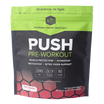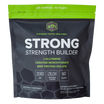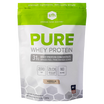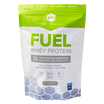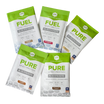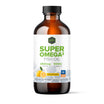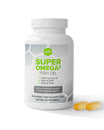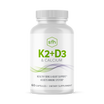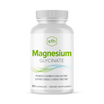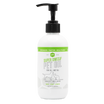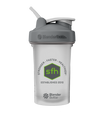Everything You Need To Know About Sugars And Sugar Alternatives
(and why SFH uses the best ingredient for you!)
Let’s talk about a sweet, sweet subject that’s been getting a ton of attention lately: sugar and sugar alternatives!
Sugar is the most well-known sweetening ingredient, but it can add unnecessary calories and mess with your blood sugar. So instead, many diet supplements and health foods use artificial sweeteners and sugar alternatives, but these also come with their fair share of controversy ke not knowing what the long-term effects of using them are. You may have also seen some recent headlines about artificial sweeteners and cardiovascular risk that may give you pause. We at SFH wanted to take some time to give you all the science behind this issue, and to reassure you that we at SFH only use the healthiest, highest quality ingredients in all of our products.
Let’s go over some of the most common kinds of sugars and sugar alternatives that you might find in your food and supplements, and dive into some of the research behind why you may not actually need to worry about the use of certain alternates (despite what the news headlines might lead you to believe).
Different kinds of sugar
First, let’s take a look at actual sugar — because as it turns out, there are quite a few different kinds. Sugar is a natural substance that’s found in a wide variety of foods including fruits, vegetables, and grains. Unfortunately, excessive amounts of sugar tend to be added to a variety of common foods, which may increase risk factors for common health issues like obesity, diabetes, and cardiovascular disease.
Glucose
Glucose is an important kind of sugar because it’s the type of carbohydrate that your body prefers to use for energy. It can be found on its own or combined with other kinds of sugars (which we’ll cover shortly), but when you eat anything with carbohydrates, your body breaks it down into a simple glucose molecule.
Fructose
Fructose can be thought of as “fruit sugar” since it's the type of sugar that’s responsible for the sweet taste of your favorite fruits. Like glucose, it’s also a simple type of sugar molecule.
Sucrose
When you think of simple table sugar, you’re probably actually thinking of sucrose. Sucrose is made with a combination of both glucose and fructose.
Lactose
Lactose is the type of sugar that you can find in milk and other dairy products. You might be familiar with the term “lactose intolerance:” in people who are lactose intolerant, their bodies do not produce the enzyme lactase, which breaks lactose down into glucose and galactose, leading to stomach discomfort.
Maltose
Maltose is a more complex sugar molecule that is made from two glucose molecules, so your body breaks it down into simpler glucose molecules when you eat them.
Galactose
Finally, galactose is another simple sugar molecule like glucose and fructose. It’s mostly found in peas, although it can also be combined with glucose to make lactose.
Most common artificial sweeteners and sugar alternatives in dietary supplements, foods, and beverages
Now, let’s get into some of the most popular artificial sweeteners and sugar alternatives out there. As the name suggests, these compounds aren’t actually sugar, but they can add a similar sweetness to your favorite foods.
Artificial sweeteners tend to have very few calories and no significant nutrients, which means that they’re commonly used in weight loss products and supplements to add some sweetness without compromising on the calorie count. Some people prefer artificial sweeteners since they don’t tend to have a significant effect on blood sugar, making them more suitable for diabetics and low-carbohydrate diets. They’re also extremely sweet, so you don’t have to use very much of them to achieve the desired taste.
It’s important to draw a distinction between artificial sweeteners and natural alternatives like stevia here. Artificial sweeteners like aspartame, saccharin, sucralose, acesulfame potassium, and sugar alcohols, are man-made by manipulating the chemical properties of various nutrients (and sometimes even sugar itself). Meanwhile, natural sugar alternatives like stevia are simply sweeteners that are extracted from natural plant sources.
Aspartame
Aspartame (you might know it as Equal®) is one of the oldest artificial sweeteners around, and is made of three different compounds: aspartic acid, phenylalanine, and methanol.
Saccharin
Saccharin is another ultra-sweet artificial sweetener that has been used for decades as a sugar alternative. You might know it by its commercial name Sweet’N Low®.
Sucralose
Sucralose, or Splenda®, is an artificial sweetener that is actually made from real sugar that has been chemically altered so that it is 600 times sweeter than sugar but with very few calories.
Acesulfame Potassium
Acesulfame potassium (Acesulfame K for short) is a sugar substitute that is made from a combination of acetoacetic acid and potassium to make a sweetener that’s 200 times as sweet as regular table sugar.
Sugar Alcohols
Finally, there are sugar alcohols like sorbitol, erythritol, xylitol, and isomalt. These are artificial sweeteners that can be made through the fermentation of fruits and vegetables but are mostly man-made through chemically altering natural glucose and sucrose. While sugar alcohols are lower in calories than regular sugar, our bodies don’t absorb them very well, which means that they can sometimes cause upset stomachs.
Stevia
Unlike the other sweeteners on this list, Stevia is not actually an artificial sweetener. Instead, it’s a natural sweetener found in the Stevia rebaudiana plant. Stevia’s sweetness comes from a group of compounds called steviol glycosides, which means that its quality can differ based on the type of steviol glycoside you’re using. Rebaudioside A (Reb A) and Rebaudioside M (Reb M) are two of the most popular and better-tasting compounds.
SFH only uses the purest, highest quality Stevia out there without any artificial additives in all of our sweetened products. This ensures that you’re getting the best taste, the least calories and sugar spiking, and the cleanest product that you possibly can.
So which artificial sweeteners should you avoid?
With the many types of sugar and sugar alternatives out there, you might now be wondering which, if any, types you should be avoiding. There’s been a ton of research on the subject, and plenty more still needs to be done to determine what the long-term effects of any artificial sweetener are in a generally healthy population. However, some things we do know:
- Artificial sweetener consumption, especially aspartame and acesulfame-K, has been associated with the increased risk of certain cancers in a human observational study in France. However, it’s important to note that correlation does not equal causation in research, and more studies on human subjects need to be done to determine an exact link since there could be other factors at play.
- Sugar alcohols are often associated with gastrointestinal issues like bloating and diarrhea since they are not as easily digestible as other carbohydrates.
- You may also want to avoid sugar alcohols if you are diabetic — while its effects on your blood sugar are less extreme than regular sugar, it can still increase your blood sugar albeit to a lesser extent.
Which sweeteners are safe?
If you are concerned about artificial sweeteners and sugar, it’s probably best to avoid artificial sweeteners altogether and use a natural alternative like stevia! Instead of being chemically altered in a lab, stevia is a natural, plant-based product that does not seem to have any significant impacts on your blood sugar levels. Some researchers have even found that it may have some anti-inflammatory and antibacterial properties!
Why you don’t actually need to avoid all sugar alternatives (despite what you may have heard recently on the news)
So we’ve covered the vast majority of sugars, natural sugar alternatives, and artificial sweeteners. But when it comes to artificial sweeteners, you might still feel a little cautious — and when you take a look at what comes out in the headlines, we don’t blame you. But it’s important to dive deeper into the research itself when it comes to this subject because the headlines themselves tend to not tell you the full story.
For example, take a look at this recent study called “The artificial sweetener erythritol and cardiovascular event risk” published in the journal Nature Magazine published in February 2023. It seemed to suggest something pretty scary: artificial sweeteners may be linked to increased cardiovascular event risk!
The study began making the rounds shortly after it was published. News outlets and media attention quickly began drawing connections between the consumption of artificial sweeteners and increased risks of heart attacks and strokes.
But the sticking point: the study itself is flawed, and the way that it was interpreted by the media made issues worse.
How the study worked: researchers took blood samples of a group of 4,000 people and measured for levels of erythritol, the sugar alcohol we’ve talked about before. They found that the people with the highest levels of blood erythritol levels were also at the highest risk of cardiac issues. Researchers believe that those high erythritol levels were promoting blood clotting, which can increase your risk for serious cardiac events like heart attack and strokes.
However, this does not inherently mean that erythritol consumption can increase your risk of cardiovascular problems. The issues with this study:
- The study design itself was flawed. There were 4,000 people who were involved in the study, which is a good amount. But only 8 of these participants didn’t already have health issues like high blood pressure, coronary disease, and diabetes.
- The researchers didn’t actually measure erythritol intake. The researchers didn’t look at erythritol consumption at all; they just measured the amount of erythritol that was in the blood of the participants. So why does this matter? Your body can actually make its own erythritol! It's formed by the fermentation of glucose (aka what carbohydrates are broken down into). In fact, in another review, researchers believe that the consumption of erythritol isn’t actually the reason that many people have such high erythritol blood levels at all — rather, it might instead come down to issues with their sugar-rich diets and impaired insulin sensitivity.
The actual conclusion here? There still isn’t enough evidence to definitively suggest that the consumption of artificial sweeteners can cause heart issues. While this observational study certainly points towards the fact that high erythritol levels may be associated with increased blood clotting and heart risks, we cannot automatically draw the conclusion that this is because of erythritol consumption.
This is why it’s so important to understand the science, especially when it comes to dietary supplements! Observational studies like this can certainly draw connections and show trends, but they are not the standard for determining whether one nutrient causes a health issue.
Key Takeaways
There’s still a lot that we don’t know about artificial sweeteners, but it’s clear that some options are better than others and that’s why SFH uses pure, high grade Stevia in our products. It’s also important to look at the research closely rather than just trusting sensationalized headlines. While there are many flawed and misquoted studies out there, it is clear that Stevia is natural, healthier, and better for you when sourced properly. With every ingredient in all of our products, SFH sources the best possible versions from around the world to create products that outperform others and stand up to the most rigorous of testing so that you can trust every single one every single time.
Meet the Author

Erica Digap is a science-minded copywriter specializing in evidence-based nutrition science, fitness, and health content. After receiving her Bachelor of Science in Clinical Nutrition from the University of California, Davis, and working as a consultant and director in the corporate diet industry for many years, she decided to set forth and use her experience and expertise to inspire readers to make lasting, healthy lifestyle changes – one nutritious meal and workout at a time.
*These statements have not been evaluated by the Food and Drug Administration. These products are not intended to diagnose, treat, cure or prevent any disease.
Sources:
- National Center of Biotechnology Information (2019, June 20). The Sweet Dangers Of Added Sugar. National Library Of Medicine. https://pubmed.ncbi.nlm.nih.gov/31246081/
- National Center of Biotechnology Information (2022, March 24). Artificial Sweeteners and Cancer Risk. National Library Of Medicine. https://pubmed.ncbi.nlm.nih.gov/35324894/
- Makinen, K. K. (2016, October 20). Gastrointestinal Disturbances Associated with the Consumption of Sugar Alcohols with Special Consideration of Xylitol: Scientific Review and Instructions for Dentists and Other Health-Care Professionals. National Library Of Medicine. https://www.ncbi.nlm.nih.gov/pmc/articles/PMC5093271/
- Castro, R. M. (n.d.). Artificial sweeteners: Any effect on blood sugar? Mayo Clinic. https://www.mayoclinic.org/diseases-conditions/diabetes/expert-answers/artificial-sweeteners/faq-20058038
- National Center of Biotechnology Information (2023, January 1). Stevia as a Natural Sweetener: A Review. National Library of Medicine. https://www.nature.com/articles/s41591-023-02223-9
- Witkowski, M., Nemet, I., Alamri, H. et al. The artificial sweetener erythritol and cardiovascular event risk. Nat Med 29, 710–718 (2023). https://doi.org/10.1038/s41591-023-02223-9
- Mela, D. J., Mazi, T. A., & Stanhope, K. L. (2023, January 1). Erythritol: An In-Depth Discussion of Its Potential to Be a Beneficial Dietary Component. National Library of Medicine. https://www.ncbi.nlm.nih.gov/pmc/articles/PMC9824470/


